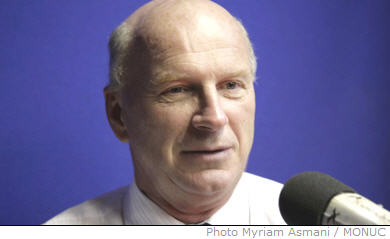In an interview with Radio Okapi on Friday 11 April 2008, European Union (EU) Special Envoy to the Great Lakes Region Roeland van de Geer said that the EU was committed to assisting the peace process in eastern DRC, and in particular to resolving the problem of the FDLR (Democratic Forces for the Liberation of Rwanda) armed group that are still active in eastern DRC.

Mr. van de Geer said that with the signing of the Nairobi communique in November 2007, a first step was taken by the DRC, Rwanda and the international community to resolve the problem of the FDLR, who have been in the DRC for over 10 years.
“The Rwandan government is putting in place an information campaign focused on the FDLR to explain that the conditions for returning to Rwanda are now there, and that they will be welcomed home,” he added.
He went on to say that the international community is accompanying the process, working closely with Kinshasa and Kigali, and the Security Council has also moved to put pressure on the FDLR with resolutions 1804 and 1807.
“We are also seeking to directly reinforce the pressure on the FDLR leaders, who are still very active in Europe. We have also asked the United States to take action. But from 8 March last, MONUC has reinforced the military pressure on the FDLR, although not through direct military action,” he explained.
Mr. van de Geer added that he was not in a position to evaluate the results of this military pressure.
“From out point of view we do not advocate a large military offensive, because we should try all non military measures, as a military solution always has consequences for the civilian population,” he said.
Meanwhile on the Goma peace process, Mr. van de Geer was “absolutely convinced” that Nkunda’s CNDP and the other armed groups were strongly engaged to the brassage* process.
“The acts of engagement were signed, and that implies brassage (for the armed groups). Now it is very important that the commission is capable of working calmly and in an atmosphere of confidence. A timetable must be planned, as brassage is a very important process,” he underlined.
In response to a question posed on the inadequacies of the brassage centre in Kamina for the work ahead, Mr. van de Geer concluded by saying that the brassage process will have “advances and shortcomings.”
“The brassage centres are among the biggest priorities for the European Union, MONUC, the United States and other international partners,” he concluded.
* Brassage is the process whereby ex DRC armed combatants are demobilised and retrained to form part of the FARDC - the DRC Armed Forces.
Related articles
- • DRC and Rwanda Sign Declaration of Principles for Peace in Eastern Congo (April 25, 2025)
- • European Union Sanctions Rwanda and M23 Officials over Congo Conflict (March 17, 2025)
- • Canada and Germany Impose Sanctions on Rwanda for Supporting M23 Rebels (March 4, 2025)
- • UK Suspends Financial Aid to Rwanda Over M23 Rebellion (February 25, 2025)
- • European Union Suspends Defence Consultations with Rwanda (February 24, 2025)
- • Tshisekedi Announces Government of National Unity and Calls for Unity Against M23 Rebels (February 23, 2025)
- • UN Security Council Calls on Rwanda to Stop Supporting M23 Rebels in DR Congo (February 22, 2025)
- • US Sanctions Rwanda's Minister James Kabarebe for Central Role in DR Congo Conflict (February 20, 2025)
- • Rwanda-Backed M23 Rebels Summarily Executed Children in Bukavu, UN Reports (February 19, 2025)
- • DR Congo Citizens Head to Polls to Elect President, Members of Parliament (December 20, 2023)
- • 'Deadly environment' plus 'political and social' obstacles hinder Ebola fight, Security Council hears (July 24, 2019)
- • Ebola outbreak declared an international Public Health Emergency (July 17, 2019)
- • At least 30 dead after massacres in Ituri (March 2, 2018)
- • Peacekeepers, Congo Army to Resume Joint Fight Against Rwandan Rebels (January 28, 2016)
- • Political tensions 'running high' in DR Congo ahead of 2016 elections (October 7, 2015)
- • DRC Army Putting Pressure on FDLR (April 1, 2015)
- • Denis Mukwege Wins Sakharov Prize 2014 (October 21, 2014)
- • Southern African Leaders to Meet in Zimbabwe (August 15, 2014)
- • Kerry Calls on Kabila to Honor Constitution (May 4, 2014)
- • Security Council extends UN mission, intervention force in DR Congo for one year (March 28, 2014)
- • Bosco Ntaganda Attacked Civilians on Ethnic Grounds, ICC Prosecutor Says (February 10, 2014)
- • New DR Congo amnesty law welcomed by UN envoys (February 5, 2014)
- • Colonel Mamadou Ndala Is Killed in Ambush (January 2, 2014)
- • No 'Peace Deal' With Defeated M23 Rebels, DR Congo Says (November 11, 2013)
- • Congo Will Not Sign a 'Peace Deal' With Defeated M23 Rebels, Government Says (November 6, 2013)
- • Congo Army Takes Control of Mbuzi Hill From M23 Rebels (November 4, 2013)
- • Kabila Congratulates Congo Army for Defeating M23 Rebels (October 30, 2013)
- • Advancing Congo Troops Take Control of Rumangabo From M23 Rebels (October 28, 2013)
- • Congo Army Liberates Rutshuru, Kiwanja and Kibumba From M23 Rebels (October 27, 2013)
- • Congo Army Dislodges M23 Rebels From Strategic Town of Kibumba (October 26, 2013)
Tags: |







